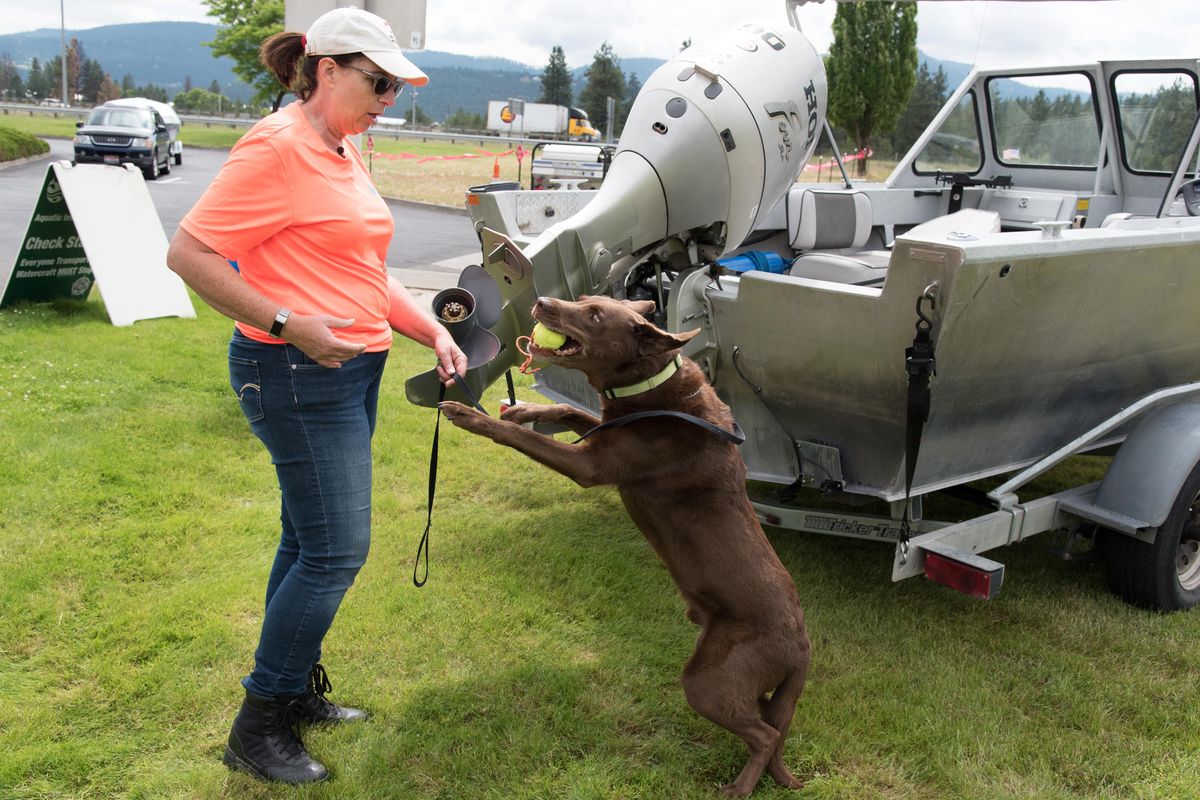Mussel-sniffing dog shows its worth detecting invasive species at Washington border

He sniffed, paused and sat. Just like the good dog he is.
Popeye, the mussel-sniffing dog, had found what he thought was an invasive aquatic mussel clinging to the side of a trailered boat. Popeye demonstrated all his olfactory skills at an Aquatic Invasive Species open house Friday on the Washington/Idaho border along I-90.
What Popeye smelled was not a real mussel. Instead, it was a sponge scented to smell like one of the tiny invaders.
The event was held at the Washington Department of Fish and Wildlife’s first permanent watercraft check station, which opened about three months ago.
“This is a big step for our program,” said Capt. Eric Anderson of the WDFW Enforcement program. “The state of Washington has a lot to lose.”
In addition to wreaking economic havoc, the mussels can change the whole ecology of lakes and rivers. It’s estimated that if the mussels entered the Columbia River system it would cost between $10 million and $25 million per hydroelectric facility per year to keep the facilities running.
Washington, Montana, Idaho and Oregon remain free of the invasive species that originates in the Caspian Sea.
The tiny mussels can clog pipes, foul dams and cover beaches, and they can travel from one part of the country to another by hitching rides on trailered boats and other watercraft. The mussels can live for up to a month out of water.
Already two contaminated boats have been stopped at the I-90 station this year.
“The threat is knocking on our door,” Anderson said.
And while many say it’s just a matter of time before the tiny interlopers enter Washington waters, Anderson said that’s no reason not to try and stop them.
“Every year we’re able to hold them off is money in the bank,” Anderson said.
Plus, the more time researchers have the more likely they are to come up with a “silver bullet.”
The permanent inspection station is part of that defensive net that hopes to hold the mussels at bay. Prior to the creation of the permanent station, which is housed in an abandoned rest stop, WDFW employees worked at a tent at the state line weigh station.
Another part of the defensive effort will be the purchase of a mussel-sniffing dog like Popeye.
Popeye and his handler, Debi Deshon, are from California where Deshon owns and operates Mussel Dogs.
WDFW likely will receive about $60,000 in grant money to purchase and train a dog similar to Popeye, Anderson said. The grant money likely will come from the Bureau of Reclamation. The dog would start working next summer.
“It makes the inspection of the boats go so fast,” Erickson said.
The permanent station is funded with fees from registered resident boats and by state legislation approved in 2017 that authorized collection of new fees from nonresident watercraft owners and commercial watercraft transporters. It also receives money from the U.S. Army Corps of Engineers and grants secured by WDFW with support from the Pacific States Marine Fisheries Commission and the Washington State Invasive Species Council.